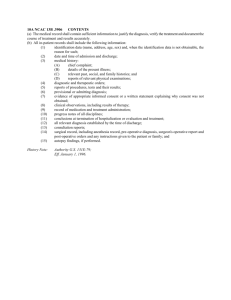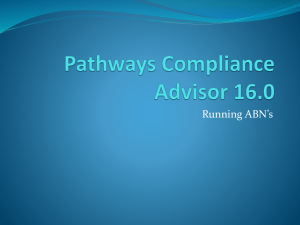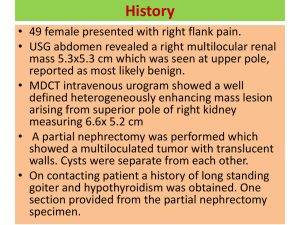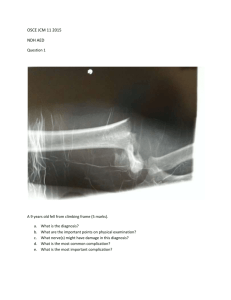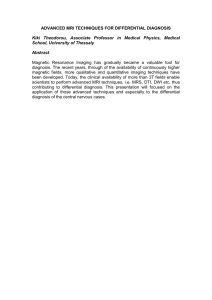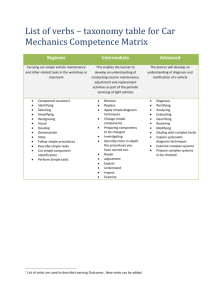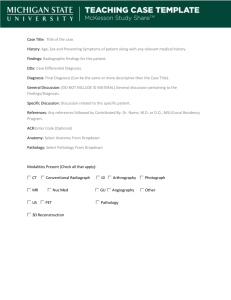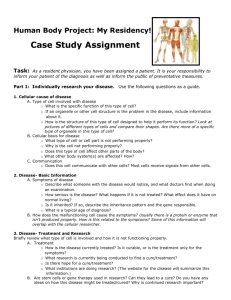Cancer Management Specification 2015
advertisement
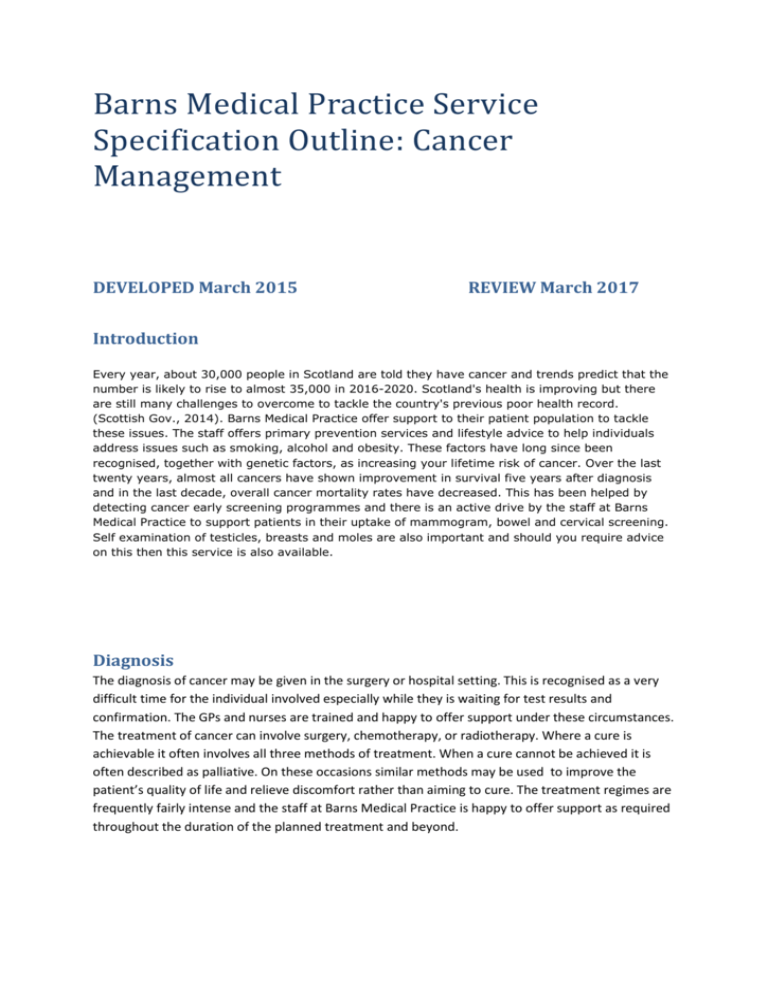
Barns Medical Practice Service Specification Outline: Cancer Management DEVELOPED March 2015 REVIEW March 2017 Introduction Every year, about 30,000 people in Scotland are told they have cancer and trends predict that the number is likely to rise to almost 35,000 in 2016-2020. Scotland's health is improving but there are still many challenges to overcome to tackle the country's previous poor health record. (Scottish Gov., 2014). Barns Medical Practice offer support to their patient population to tackle these issues. The staff offers primary prevention services and lifestyle advice to help individuals address issues such as smoking, alcohol and obesity. These factors have long since been recognised, together with genetic factors, as increasing your lifetime risk of cancer. Over the last twenty years, almost all cancers have shown improvement in survival five years after diagnosis and in the last decade, overall cancer mortality rates have decreased. This has been helped by detecting cancer early screening programmes and there is an active drive by the staff at Barns Medical Practice to support patients in their uptake of mammogram, bowel and cervical screening. Self examination of testicles, breasts and moles are also important and should you require advice on this then this service is also available. Diagnosis The diagnosis of cancer may be given in the surgery or hospital setting. This is recognised as a very difficult time for the individual involved especially while they is waiting for test results and confirmation. The GPs and nurses are trained and happy to offer support under these circumstances. The treatment of cancer can involve surgery, chemotherapy, or radiotherapy. Where a cure is achievable it often involves all three methods of treatment. When a cure cannot be achieved it is often described as palliative. On these occasions similar methods may be used to improve the patient’s quality of life and relieve discomfort rather than aiming to cure. The treatment regimes are frequently fairly intense and the staff at Barns Medical Practice is happy to offer support as required throughout the duration of the planned treatment and beyond. Regular Review Within 6 months of diagnosis, if there has not been a face to face consultation, a member of the clinical team within the surgery will call and discuss the cancer management. This is often done via telephone as the patient undergoing treatment can be busy with scheduled appointments in the hospital setting. An enquiry as to how the patient is coping will be made and if there are any physical or psychological unmet needs then these can be highlighted and addressed. The clinician may be responsible for prescribing some routine medications and will usually carry out a review of your medication at that time. Once discharged from the hospital consultant there is no recall system in place for patients who have undergone cancer treatment. However a cancer care review appointment can be booked by the patient to see a chosen clinician and any issues will be addressed. The aim following treatment is to support the patient in self-management. However it is recognised that survivorship of a cancer diagnosis can bring its own challenges. Below are a list of resources that may help and appendix 1 shows an outline of a cancer care review template should any patient wish to attend such a consultation. Patients requiring palliative care will have their management planned on an individual basis and the aim is to work closely with any other agencies involved to ensure the best quality of life possible. Discussions with the patient and their family may take place to try and ensure that all needs are met and issues such as pain management, complimentary therapies, the preferred place of dying and choices around options to resuscitate or not can be explored. Resources for Staff and or Patients Macmillan Cancer Support- http://www.macmillan.org.uk/information Cancer Research UK - http://www.cancerresearchuk.org Healthtalkonline - http://www.healthtalk.org/peoples-experiences Beatson West of Scotland Cancer Centre - http://www.beatson.scot.nhs.uk/content/ Maggie Cancer Caring Centre - https://www.maggiescentres.org/our-centres/maggies-glasgow/ Cognative Behavioural Therapy: Living Life to The Full is a free online CBT course – www.livinglifetothefull.com Ayrshire Hospice - http://www.ayrshirehospice.org/ Ayrshire Cancer Support- http://www.ayrshirecs.org/ Staff involved and training required All staff involved in cancer management will be trained and have a special interest in cancer management. The trained nurses and doctors are committed to regular updates and keep abreast of developments in cancer care. However, it is recognised that some of the management options and treatments are specialised and if working out with their sphere of competence than they will liaise with the appropriate professionals to ensure that all the needs of the patient are best addressed. The Health Care Assistant is trained in phlebotomy and if the appointment is for bloods only it can be made with her. Advertising of service to patients The patient will be informed at first point of contact and the service specification will be available on the website. PROTOCOL FOR THE MANAGEMENT ATTENDING FOR A CANCER CARE REVIEW Aim To effectively manage the individuals who have been diagnosed with cancer at any stage of the disease from diagnosis. To review the impact of cancer or treatment related symptoms on quality of life and daily living. The long term aim where treatment has been successful is to support self management. Eligible Patient Any individual who has received a diagnosis of cancer. Staff Eligible to Manage These Patients Any 1st level nurse working within her/his sphere of clinical competence and committed to ongoing training and education with regard to cancer management. The Review Appointment 1. The patient will be seen in the privacy of a consulting room. Computerised clinical notes will be available and the cancer care guideline template will be utilised. 2. A 20-minute appointment will be offered. 3. The nurse will review current medication and concordance will be discussed. Side effects will be discussed and managed accordingly. 4. Co-ordination of care will be discussed and explore options including 3rd sector support where relevant. This may assist with counselling, support resources and financial advice. 5. Review of physical health including physical activity, mobility, pain , fatigue, loss of energy, sexual dysfunction , fertility issues and concentration 6. Review of mental health will take place including the impact of the diagnosis on psychological wellbeing, anxiety, concerns re. future prognosis and body image issues where relevant. 7. Preventative health including flu vaccine where indicated. 8. Documentation of the consultation will take place in the clinical notes and computer cancer care review guideline. 9. The nurse will liaise/refer with GP regarding any management concerns. REFERENCES

